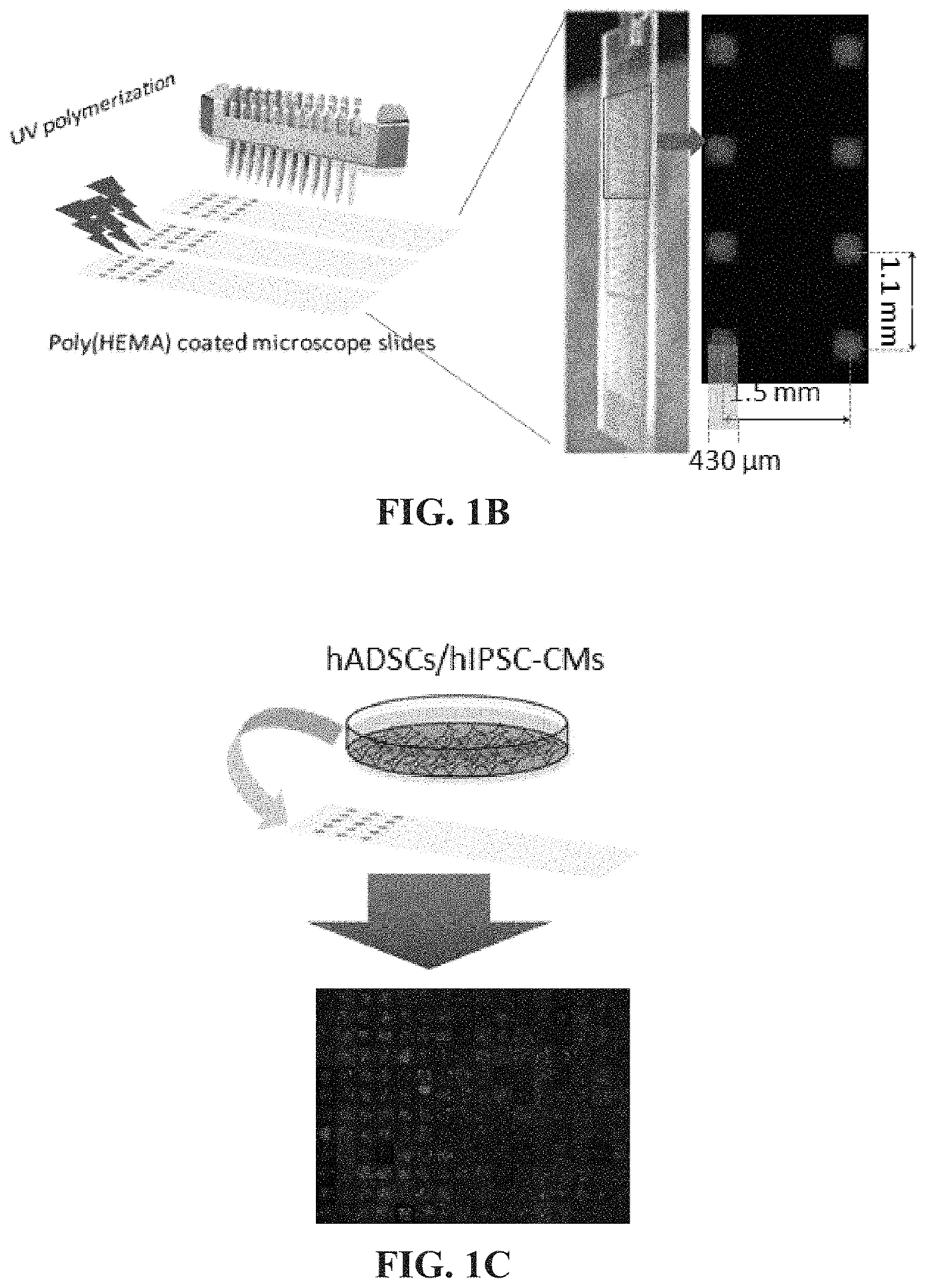Bi-functional arginine-glycine-aspartic acid (RGD) peptides and methods to promote angiogenesis
a technology of arginine glycine and aspartic acid, which is applied in the field of arginine glycine aspartic acid (rgd) peptide compounds, can solve the problems of ischemic diseases that affect the normal blood supply, cell death, permanent loss of heart functions, etc., and achieve the effect of promoting tissue regeneration and treating or preventing ischemic injuries
- Summary
- Abstract
- Description
- Claims
- Application Information
AI Technical Summary
Problems solved by technology
Method used
Image
Examples
example 1
nt of Peptide-Functionalized Synthetic Hydrogel Microarrays for Stem Cell and Tissue Engineering Applications
[0084]This experimental section describes the development of a platform technology based on light-assisted co-polymerization of poly(ethylene glycol) diacrylates (PEGDA) and methacrylated-peptides to fabricate peptide-functionalized hydrogel microarrays. To this end, the high efficiency of solid-phase peptide synthesis and isocyanation chemistry was leveraged to develop a robust synthetic route for preparing methacrylated-peptides. Due to their high solubility in DMF and high miscibility with low molecular PEGDA, methacrylated-peptides can be effectively incorporated into PEG hydrogels in a ratiometric and homogenous manner. In addition, several parameters were optimized, including the length of the linker between methacrylate functional groups and cell-binding peptide moieties to ensure high accessibility of the peptide functional groups to the cell-surface receptors. To app...
example 2
icroarray Technology Enabled Discovery of a Bi-Functional RGD Peptide that Promotes Endothelial Cell Adhesion, Spreading and Proliferation
[0124]We used the peptide-functionalized hydrogel microarray technology described in the Example 1 to screen the RGD (SEQ ID NO:36) peptide library for the high affinity ligands to endothelial cell (EC) integrin. This enabled the identification of a novel RGD (SEQ ID NO:36) peptide (α1) derived from laminin-α1 domain with dramatically enhanced ability to promote EC adhesion, spreading and proliferation in comparison with the currently used RGDS (SEQ ID NO:35) / RGDS (SEQ ID NO:35) peptide. The mechanistic studies revealed the α1 peptide binds to both αvβ3 and VLA-6 integrin that lead to the synergistic up-regulation of VEGFR2 with the improved EC functions.
[0125]Materials and Instruments.
[0126]All chemicals used for this study were purchased from Sigma-Aldrich (St. Louis, Mo.) unless otherwise stated. Microarray spotting pins (946MP9B) were purchase...
example 3
ic Effect of Integrin-Binding Peptide and Angiogenic Factors
[0157]We hypothesized that spatiotemporal distribution of VEGF mimetic QK peptide can significantly affect the crosstalk between α1 peptide initiated integrin signaling and QK peptide initiated VEGFR2 signaling, which is important to EC morphogenesis and angiogenesis.
[0158]To synergize with the α1 peptide, we used the α1 peptide and an MMP-responsive QK peptide (i.e., GPQG↓IAGKLTWQELYQLKYKGI, SEQ ID NO:41) to prepare an alginate-based injectable, multi-signaling hydrogels (FIG. 9). The MMP-responsive QK peptide was selected to introduce cell-dictated local release of angiogenic factors to recapitulate the pro-angiogenic microenvironment in vivo, where matrix bound VEGF is released by MMPs. Alginates was selected because it has been used as a biocompatible, injectable hydrogel-forming material to treat ischemic diseases.
[0159]We developed a modular approach to prepare the multi-signaling hydrogels (FIG. 10). Briefly, we have...
PUM
| Property | Measurement | Unit |
|---|---|---|
| w/w | aaaaa | aaaaa |
| v/v | aaaaa | aaaaa |
| w/w | aaaaa | aaaaa |
Abstract
Description
Claims
Application Information
 Login to View More
Login to View More - R&D
- Intellectual Property
- Life Sciences
- Materials
- Tech Scout
- Unparalleled Data Quality
- Higher Quality Content
- 60% Fewer Hallucinations
Browse by: Latest US Patents, China's latest patents, Technical Efficacy Thesaurus, Application Domain, Technology Topic, Popular Technical Reports.
© 2025 PatSnap. All rights reserved.Legal|Privacy policy|Modern Slavery Act Transparency Statement|Sitemap|About US| Contact US: help@patsnap.com



